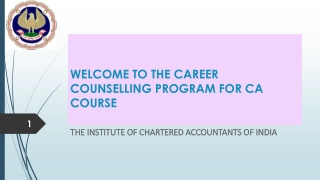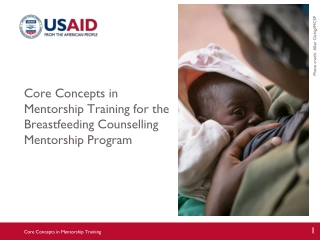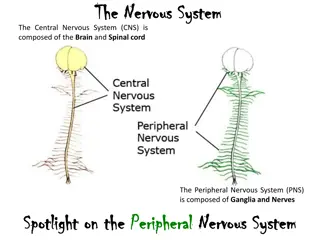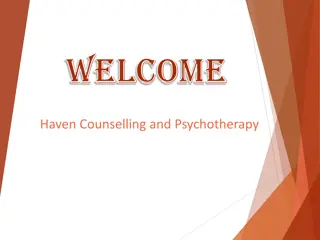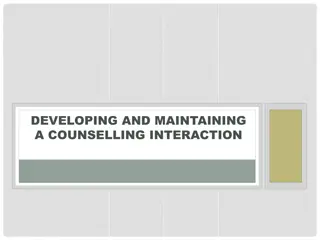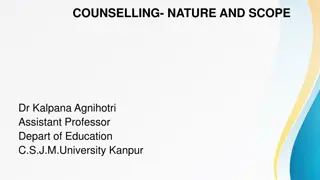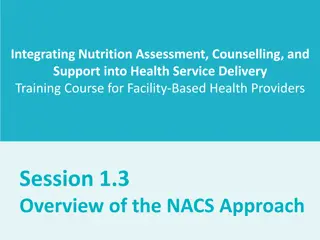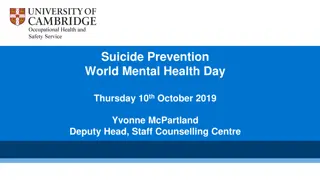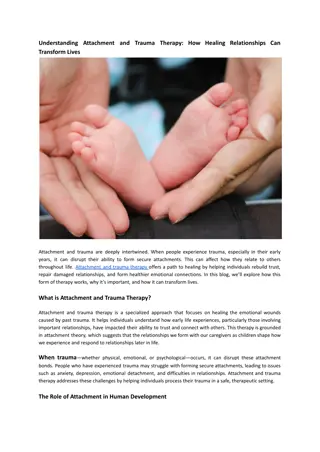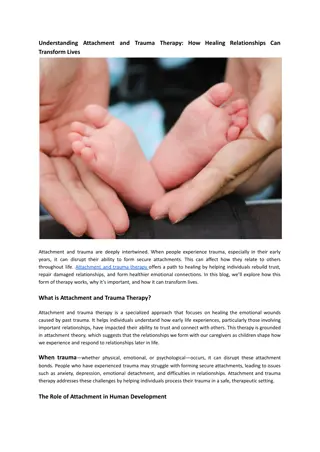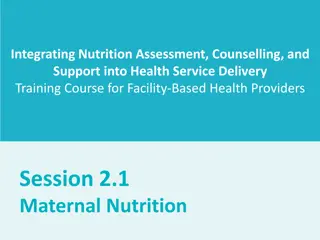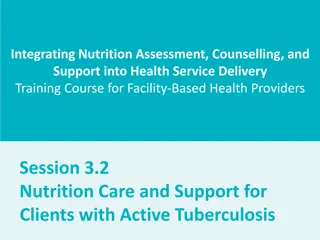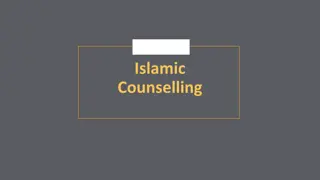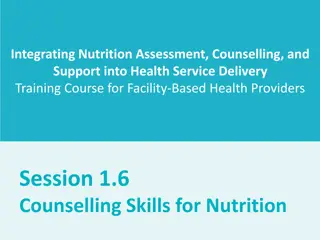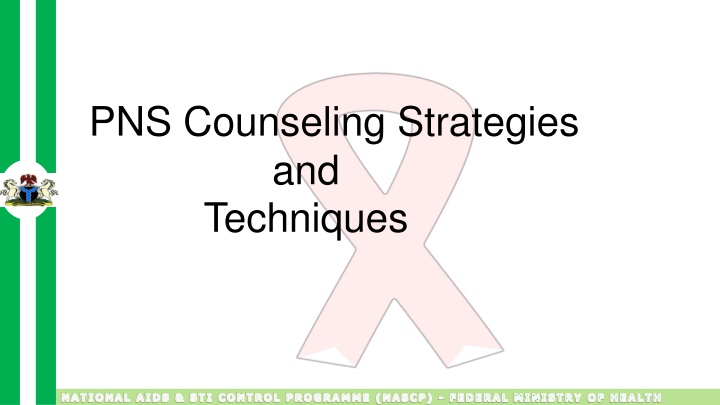
Counseling Strategies and Techniques for National AIDS & STI Control Programme
Explore the concepts of counseling, review approaches, and techniques, and identify essential skills required for effective counseling sessions within the National AIDS & STI Control Programme facilitated by the Federal Ministry of Health. Counseling is defined as a confidential dialogue to help clients cope with difficult situations through informed decision-making. The process involves a counselor assisting the client in problem resolution and behavior examination to initiate positive changes. Counseling is distinguished from giving advice, education, and ongoing therapy, emphasizing a non-directive, supportive approach.
Download Presentation

Please find below an Image/Link to download the presentation.
The content on the website is provided AS IS for your information and personal use only. It may not be sold, licensed, or shared on other websites without obtaining consent from the author. If you encounter any issues during the download, it is possible that the publisher has removed the file from their server.
You are allowed to download the files provided on this website for personal or commercial use, subject to the condition that they are used lawfully. All files are the property of their respective owners.
The content on the website is provided AS IS for your information and personal use only. It may not be sold, licensed, or shared on other websites without obtaining consent from the author.
E N D
Presentation Transcript
PNS Counseling Strategies and Techniques NATIONAL AIDS & STI CONTROL PROGRAMME (NASCP) - FEDERAL MINISTRY OF HEALTH
Session Objectives At the end of this session participants will be able to: Discuss the concepts of counselling Discuss selected approaches to counselling Define the process of Counseling Identify skills required for Counseling Review Counseling techniques Demonstrate and observe Counseling techniques NATIONAL AIDS & STI CONTROL PROGRAMME (NASCP) - FEDERAL MINISTRY OF HEALTH
COUNSELLING Definition: Counselling is a confidential dialogue between a counsellor and a client(s) aimed at helping the client cope with a difficult situation through informed decision making. The counsellor s role is to help the client to help himself or herself. In a CT setting, counselling can be done with an individual or with couples NATIONAL AIDS & STI CONTROL PROGRAMME (NASCP) - FEDERAL MINISTRY OF HEALTH
Counseling Counseling is a process that involves a relationship between two people who meet so that one person can help the other to resolve problem. Counselor may help the client to examine the situation or behavior which are troublesome and have implications for infection transmission and also help them to explore ways to initiate some change. NATIONAL AIDS & STI CONTROL PROGRAMME (NASCP) - FEDERAL MINISTRY OF HEALTH
Counseling is: Not giving advice Not guidance Different from education Different from ongoing therapy Not a conversation Not telling someone what to do Not solution to all problems Not an interrogation NATIONAL AIDS & STI CONTROL PROGRAMME (NASCP) - FEDERAL MINISTRY OF HEALTH
Counseling is: Not a confession Not a forum in which to speak or promote his own opinions Is not information giving Not a search for a diagnosis Not praying or preaching NATIONAL AIDS & STI CONTROL PROGRAMME (NASCP) - FEDERAL MINISTRY OF HEALTH
Some examples of non-counselling responses You think you have a problem, let me tell you about mine Let me tell you what to do If I were you, I would I understand because I once had the same problem I will take charge and deal with it or, leave it all to NATIONAL AIDS & STI CONTROL PROGRAMME (NASCP) - FEDERAL MINISTRY OF HEALTH
Counselling Process - GATHER G - Greet A - Ask T - Tell H - Help E - Explain R - Return NATIONAL AIDS & STI CONTROL PROGRAMME (NASCP) - FEDERAL MINISTRY OF HEALTH
Counseling Strategies for PNS Client-centered approach Strengths-based approach Motivational Interviewing Addressing Contradictions-Creating dissonance Constructive Confrontation NATIONAL AIDS & STI CONTROL PROGRAMME (NASCP) - FEDERAL MINISTRY OF HEALTH
Client-centered Counseling Meeting the clients where they are NATIONAL AIDS & STI CONTROL PROGRAMME (NASCP) - FEDERAL MINISTRY OF HEALTH
A growth promoting climate Genuineness, realness or congruence Unconditional positive regard Empathetic understanding NATIONAL AIDS & STI CONTROL PROGRAMME (NASCP) - FEDERAL MINISTRY OF HEALTH
General Principles Individualized sessions Partnership with the patient Utilizes active listening skills and techniques Acknowledges the unique context of a patient s life o Priorities and concerns are identified by the patient o Identify what patient is ready, willing or able to change Focus is on the feelings and factors that influence behavior. Information alone does not always lead to behavior Change NATIONAL AIDS & STI CONTROL PROGRAMME (NASCP) - FEDERAL MINISTRY OF HEALTH
Essential Skill-Active Listening Techniques Repeating Paraphrasing Reflecting Curiosity Reframing Interpretation Process Comment Open-ended Questions Open body language Constructive confrontation NATIONAL AIDS & STI CONTROL PROGRAMME (NASCP) - FEDERAL MINISTRY OF HEALTH
Strength-based approach Working with strengths! NATIONAL AIDS & STI CONTROL PROGRAMME (NASCP) - FEDERAL MINISTRY OF HEALTH
Strength-Based Counseling Strengths: The qualities or abilities that help a person cope with life and make life more fulfilling for oneself and others. Resilience: The ability to withstand, recover or adapt in difficult conditions; or recover quickly from illness, trauma, change, or tragedy. NATIONAL AIDS & STI CONTROL PROGRAMME (NASCP) - FEDERAL MINISTRY OF HEALTH
The vision of a better future! c Competen ce Capacities CourageP Resilience Reserves Resources Resourcefuln ess R Promise Possibility Positive expectations Potential Stren gths NATIONAL AIDS & STI CONTROL PROGRAMME (NASCP) - FEDERAL MINISTRY OF HEALTH
Strength-based Questions Coping questions Exception finding questions What s better questions Scaling questions The miracle question NATIONAL AIDS & STI CONTROL PROGRAMME (NASCP) - FEDERAL MINISTRY OF HEALTH
Principles of the Strengths Perspective 1. Every individual, group, family & community has strengths 2. Many struggles may be injurious, but may also be the sources of challenge and opportunity 3. Assume that you do not know the upper limits of the capacity to grow & change 4. We best serve clients by collaborating with them 5. Every environment is full of resources 6. Caring, caretaking and context NATIONAL AIDS & STI CONTROL PROGRAMME (NASCP) - FEDERAL MINISTRY OF HEALTH
Exception Finding Questions Exceptions are times when the problem did not exist, or could have happened but did not. The focus is on the who , what , when and where of exception times to find out what else was going on the person s life to recreate those conditions in the present. The point is to identify the abilities/resources/supports the client used successfully in the past. Those strengths/abilities could be transferred and used again. NATIONAL AIDS & STI CONTROL PROGRAMME (NASCP) - FEDERAL MINISTRY OF HEALTH
Scaling Questions Ask patient to rate themselves in terms of their ability to accomplish something Explore what being higher on the scale would look like Explore why they are where they are and not lower NATIONAL AIDS & STI CONTROL PROGRAMME (NASCP) - FEDERAL MINISTRY OF HEALTH
Contradictions Contradiction is a A situation in which inherent factors , actions, or propositions are inconsistent or contrary to one another. NATIONAL AIDS & STI CONTROL PROGRAMME (NASCP) - FEDERAL MINISTRY OF HEALTH
Addressing Contradictions 1. Identify a contradiction in what client is saying 2. Determine if it is relevant to HIV or disclosure 3. Formulate non-judgmental response that paraphrases and reflects 4. Follow clients lead, using constructive confrontation techniques. NATIONAL AIDS & STI CONTROL PROGRAMME (NASCP) - FEDERAL MINISTRY OF HEALTH
Mediation Techniques for Easing Tension and Diffusing Blame Normalize feelings, reactions, and experiences. Remind the client that they are not alone. Focus on the present and the future. Avoid and deflect questions aimed at identifying the source of infection. Express confidence in the client s ability to deal with HIV-related issues. Acknowledge feelings and emotions, and predict that in time their intensity will likely change or shift. 23 NATIONAL AIDS & STI CONTROL PROGRAMME (NASCP) - FEDERAL MINISTRY OF HEALTH
Brief Motivational Interviewing A client centered counseling style for eliciting behavior change by helping clients explore and resolve ambivalence. Designed to produce rapid, internally motivated change by mobilizing the client s own change resources. Miller and Rollnick, 1991 NATIONAL AIDS & STI CONTROL PROGRAMME (NASCP) - FEDERAL MINISTRY OF HEALTH
The Spirit of Motivational Interviewing R path to notifying their partner. U to notifying their partner(s) and child(ren) L perspective. Seek to understand, before being understood. RESIST telling the client what do: Avoiding telling, directing, or ordering the client about the right UNDERSTAND their motivations: Seek to understand their values, needs, motivations, and barriers LISTEN with empathy: Put aside your viewpoint and try to see things from the client s EMPOWER the client to take action: Work with the client to set achievable goals and to identify techniques for overcoming their perceived barriers and challenges E NATIONAL AIDS & STI CONTROL PROGRAMME (NASCP) - FEDERAL MINISTRY OF HEALTH
The Spirit of Motivational Interviewing, cont. Enhance Empathy Engage Focus Develop Discrepancy Evoke Roll with Resistance Plan Support Self-Efficacy NATIONAL AIDS & STI CONTROL PROGRAMME (NASCP) - FEDERAL MINISTRY OF HEALTH
OARS Strategy for Brief Motivational Interviewing Open-ended Questions Affirming Statements Reflective Listening Summarize the Conversation NATIONAL AIDS & STI CONTROL PROGRAMME (NASCP) - FEDERAL MINISTRY OF HEALTH
How is BMI used in the context of index testing? Counselor gets permission to discuss index testing with client Counselor helps client identify what the challenges are for changing a behavior (such as informing partner(s) about the need to test, linking to care, disclosing HIV status, etc) Counselor helps client identify solutions to challenges (i.e. tailor ways to inform each partner based on disclosed challenges) Counselor provides information, advice and feedback as needed Counselor helps client identify level of motivation to inform partner(s) and understands that time needed to inform partners will vary across clients Counselor encourages and supports client s commitment to inform partner(s) and plan for action 28 NATIONAL AIDS & STI CONTROL PROGRAMME (NASCP) - FEDERAL MINISTRY OF HEALTH
Brief Motivational Interviewing as a Strategy for Partner Elicitation Useful framework and technique for helping clients overcome challenges to notifying their partner(s) and/or getting their child(ren) tested for HIV Assumes client knows what his/her barriers are to changing their behavior Counselors role is to help client identify these issues and develop and a plan to address Creates a cognitive dissonance (or discrepancy) between where one is and where one wants to be NATIONAL AIDS & STI CONTROL PROGRAMME (NASCP) - FEDERAL MINISTRY OF HEALTH
Key Strategies and Techniques for BMI (cont) Ask permission Ask client for permission to talk about index testing Clients more likely to engage in discussion if they agree up front Use open ended questions to elicit information from the client on perceived challenges/barriers to index testing Assess clients challenges and barriers with index testing (e.g. naming or informing partners) Potential barriers: they re married and have other partners, logistical (such as they re no longer in contact in their partner), or emotional such as not ready to deal with diagnosis or disclose their status 30 Example of an open ended question, What concerns do you have about telling your partner about the need to get an HIV test? NATIONAL AIDS & STI CONTROL PROGRAMME (NASCP) - FEDERAL MINISTRY OF HEALTH
Key Strategies and Techniques for BMI (cont) Normalize client s challenges with affirming statements: A lot of people have difficulty telling their partner about the need to take an HIV test Many people aren t quite sure how to tell their partner, especially partners you may not speak to anymore Reflect back what client tells you to show you have understood such as, It sounds like you are not sure how to bring it up or how to tell him . It sounds like you are worried that your wife may find out about your other girlfriend NATIONAL AIDS & STI CONTROL PROGRAMME (NASCP) - FEDERAL MINISTRY OF HEALTH
Key Strategies and Techniques for BMI (cont) Help client identify solutions to overcome these barriers Assist client in identifying solutions to address their concerns Some situations require concrete solutions while others require information, support and encouragement include: A client who doesn t know what to say to their partner will need assistance in determining the best method for telling their partner (i.e. client vs provider vs dual method) and may need to practice what they should say if they choose the client referral method A client who is concerned about others learning their HIV status will need support through the provider referral method and reassurance that you will protect their confidentiality by not disclosing their identify or status to anyone you contact NATIONAL AIDS & STI CONTROL PROGRAMME (NASCP) - FEDERAL MINISTRY OF HEALTH
Key Strategies and Techniques for BMI (cont) Provide information, advice and feedback as needed Many clients lack basic information such as the different ways in which to alert partners about the need to get tested, the risk of transmission at different stages of HIV infection, benefits of early ART/treatment, etc. and need accurate information Some clients will need direct advice or information to address issue such as: Do you know that HIV-positive persons who are on treatment can live longer, healthier lives and that treatment significantly reduces the risk of passing the virus on to your partner(s) or babies? Are you aware that your partner can be notified about the need to seek an HIV test without you having to disclose your HIV status to him? 33 NATIONAL AIDS & STI CONTROL PROGRAMME (NASCP) - FEDERAL MINISTRY OF HEALTH
Key Strategies and Techniques for BMI (cont) Assess readiness for change Ask clients if they are ready to take this step to notify their partner(s) and child(ren) about the need to get an HIV test Many clients will be ready to move forward with index testing if given the proper information, encouragement and support or assistance Others may not be ready to deal with their situation and may need more time, information, support and encouragement Schedule another time to meet with client if they are not able to commit to telling their partners or having you help them tell their partners Remember: index testing is NOT a one time event 34 NATIONAL AIDS & STI CONTROL PROGRAMME (NASCP) - FEDERAL MINISTRY OF HEALTH
Key Strategies and Techniques for BMI (cont) Reinforce the client s commitment to take positive steps for their health and the health of others It takes courage to face your HIV diagnosis and help others to know theirs. I know it is hard to tell your family you are HIV-positive, but you will feel better once you have their support and you know they are getting the care they need Summarize the conversation and the client s plan for notifying their partner To review, you will tell your partner, John, about your HIV after church on Sunday. Remember to do it just like we practiced. You will also bring your daughter to your next ART appointment so we can test her for HIV. I am here if you need me 35 NATIONAL AIDS & STI CONTROL PROGRAMME (NASCP) - FEDERAL MINISTRY OF HEALTH
Discussion Question: Brief Motivational Interviewing How is BMI different from, or similar to, other individual HIV counselling that you have been providing? How can BMI be applied to your work with index testing and partner services? NATIONAL AIDS & STI CONTROL PROGRAMME (NASCP) - FEDERAL MINISTRY OF HEALTH
Mediation Techniques for Easing Tension and Diffusing Blame Normalize feelings, reactions, and experiences. Remind the client that they are not alone. Focus on the present and the future. Avoid and deflect questions aimed at identifying the source of infection. Express confidence in the client s ability to deal with HIV-related issues. Acknowledge feelings and emotions, and predict that in time their intensity will likely change or shift. 37 NATIONAL AIDS & STI CONTROL PROGRAMME (NASCP) - FEDERAL MINISTRY OF HEALTH
Lets Problem Solve! Instructions: Take a moment and think about how you would approach this situation with the person sitting next to you. We will then discuss as a large group. Case Study You are interviewing a woman who has recently tested positive. She indicates that she has had two partners during the interview period. She is willing to talk to you about notifying one partner, but does not want to discuss the other at all because he is married and his wife is pregnant . What are some strategies you might use to ensure that both partners get tested? What messages would you give this client? NATIONAL AIDS & STI CONTROL PROGRAMME (NASCP) - FEDERAL MINISTRY OF HEALTH
Thank you 39 NATIONAL AIDS & STI CONTROL PROGRAMME (NASCP) - FEDERAL MINISTRY OF HEALTH

